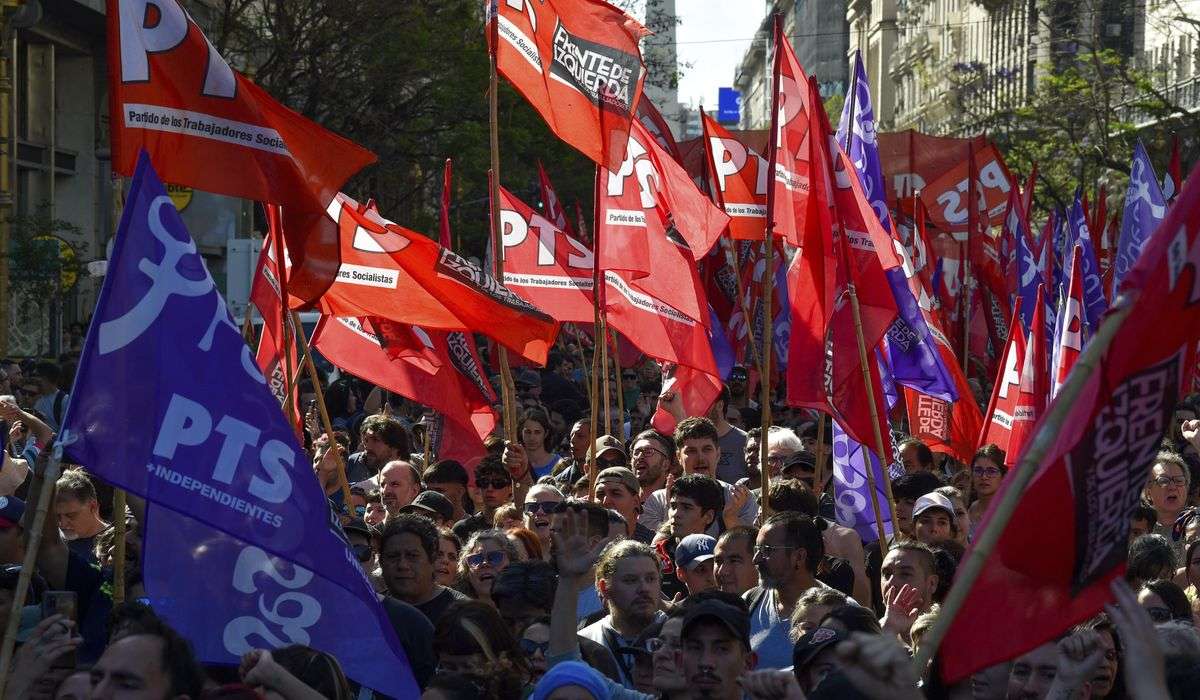Thousands take to the streets to protest austerity measures of Argentina’s new President Milei

BUENOS AIRES, Argentina — Protests against austerity and deregulation measures announced by newly elected President Javier Milei went off relatively peacefully in Argentina‘s capital Wednesday, after a government warning against blocking streets.
Around the start of the protest, which drew thousands of marchers, police briefly scuffled with some demonstrators and two men were arrested. But the event concluded without widespread street blockages that have been frequent in past years.
Milei’s administration has said it will allow protests, but threatens to cut off public aid payments to anyone who blocks thoroughfares. Marchers were also forbidden to carry sticks, cover their faces or bring children to the protest.
Marchers set out toward Buenos Aires‘ iconic Plaza de Mayo, the scene of protests dating back to the country’s 1980s dictatorship. Police struggled to keep demonstratos from taking over the entire boulevard, and in the end many kept to the sidewalks and filled about half the plaza.
Eduardo Belliboni, one of the march’s organizers, said demonstrators faced “an enormous repressive apparatus.” Belliboni’s left-wing Polo Obrero group has a long history of leading street blockages.
Belliboni claimed marches wouldn’t fit on the sidewalks. “This (the street) is where people move around all over the world … where are we going to fit 50,000 people?” he said.
PHOTOS: Thousands take to the streets to protest austerity measures of Argentina’s new president
Toward the end of the demonstration, organizers called on the country’s trade unions to declare a general strike.
Milei, a right-wing populist, is facing the first test of how his administration responds to demonstrations against economic shock measures, which he says are needed to address Argentina’s severe crisis.
The steps include a 50% devaluation of the Argentine peso, cuts to energy and transportation subsidies, and the closure of some government ministries. They come amid soaring inflation and rising poverty.
Protesters “can demonstrate as many times as they want. They can go to the squares .. but the streets are not going to be closed,” Milei’s security minister, Patricia Bullrich, told local media.
Bullrich announced a new “protocol” to maintain public order that allows federal forces to clear people blocking streets without a judicial order and authorizes the police to identify – through video or digital means – people protesting and obstructing public thoroughfares. It can bill them for the cost of mobilizing security forces.
Some groups say the protocol goes too far and criminalizes the right to protest.
Hours before the protest, police officers were deployed in downtown Buenos Aires and other parts of the city but mainly at the entrances to the capital and some public transportation stations.
Argentine labor, social and human rights groups on Tuesday signed a petition asking the United Nations and the Inter-American Commission on Human Rights to intercede against the new public order procedures. The document says the security protocol is “incompatible with the rights to free assembly and association, freedom of expression and social protest” recognized by Argentina‘s constitution.
On Monday, the government announced that people who block streets could be removed from the public assistance benefit lists if they are on one.
“To the beneficiaries of social plans: know that no one can force you to go to a march under threat of taking away your plan,” said Sandra Pettovello, head of the newly created Human Capital Ministry, which combines what were the ministries of Labor, Education and Social Development.
“Protesting is a right, but so is the right of people to move freely through Argentine territory to go to their workplace,” she said.
In Argentina, some people receive social support directly from the government, but others get support through social organizations with direct links to federal offices. Milei’s administration says many of these groups use this as a way to force people to go out to protests in exchange for support.
Wednesday’s march coincided with the 22nd anniversary of a protest against government handling of an economic crisis that left dozens dead and led to the resignation of then-President Fernando de la Rúa.
A recent poll by the University of Buenos Aires’ Observatory of Applied Social Psychology said 65% of those surveyed agree with banning street blockages.
Milei, a 53-year-old economist who rose to fame on television with profanity-laden tirades against what he called the political caste, became president with the support of Argentines disillusioned with the economic crisis.
Argentina has an annual inflation rate of 161%, and four out of every 10 people are poor. The South American country also faces a $45 billion debt owed to the International Monetary Fund.






